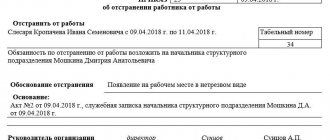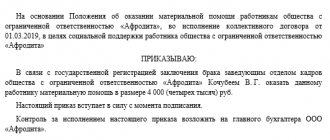Grounds and reasons
Article 76 of the Labor Code of the Russian Federation lists situations in which an employee is necessarily suspended from work:
state of intoxication (drug, alcohol, toxic);- the employee has not undergone training and knowledge testing on labor protection;
- lack of medical examination results;
- medical contraindications for performing work;
- suspension of a special permit or employee's right;
- requirement of authorized government bodies or officials (labor inspectorate, court, etc.);
- other cases mentioned in the current legislation.
When can an employee be suspended from work?
Article 76 of the Labor Code of the Russian Federation specifies cases when an employee can be suspended from work. These include situations if:
- The employee showed up at work under the influence of alcohol or drugs. In this case, the employee undergoes a medical examination, which must be signed by the employee himself and other employees who witnessed this event.
- The employee has not passed a knowledge test or training in the field of labor protection. This requirement is established by Article 214 of the Labor Code of the Russian Federation. Failure to comply with the requirement does not allow the employee to continue performing work duties.
- The employee does not have a certificate of mandatory medical examination. This includes routine examinations, examinations by a psychiatrist in certain cases, and examinations for occupational diseases.
- Suspension from work for medical reasons or when contraindications to the employee’s performance of official duties are discovered.
- Suspension from work is also possible if the employee’s special rights (driver’s license, license to carry weapons, etc.) expire. That is, if an employee is unable to fully perform his job duties. In this case, the manager may offer the employee another position in which the employee may receive a lower salary. A prerequisite is that the place of work for the new position is located in the same place where the employee worked before the suspension, unless otherwise specified in the employment contract.
- At the request of persons authorized by regulations and federal laws. These persons may be labor inspectors or sanitary inspection representatives.
Article 76 of the Labor Code of the Russian Federation does not provide a complete list of grounds for removal, because some cases are prescribed in other codes and acts.
Procedure (registration of suspension from work)
How to formalize suspension from work? In many cases, the formalization of removal depends on the rules of the organization itself and the grounds. In some industries - transport, food, public catering - this procedure has been simplified.
If a circumstance is discovered that serves as a reason for preventing an employee from performing work duties, it is recorded in writing.
For this purpose, a memorandum or act is drawn up addressed to the manager. They are signed by the originator and witnesses.
According to the general rules, removal is issued in the form of an order or regulation; a unified form has not been developed for them. The document is signed by the head of the organization .
The order states:
the circumstances due to which such a need arose;- the period for which the employee is suspended (if this can be determined) or the action taken (for example, undergoing a medical examination);
- if necessary, who will perform the duties of the suspended person.
If it is necessary to quickly remove, for example, a drunk employee, a simplified procedure is used.
Then the removal occurs on the initiative of a medical service worker, based on data from a pre-trip examination, by direct management. But an order or instruction will still be required, since such a measure is usually associated with the cessation of payroll.
Pay does not always stop. If the circumstances due to which the employee was suspended were not his fault, accruals continue, but in the amount of 2/3 of earnings.
Sometimes there is a need for a temporary transfer, for which the personnel department looks for a vacant position.
A pregnant woman is removed from work for medical reasons if she needs easier work. She retains the average salary for her previous job.
Until feasible work is found for her, she can exercise her right to release. In this case, she also retains her average earnings.
sample order for dismissal from work.
Grounds for removal
Based on current legislation, the following circumstances have been established for which an employee can be suspended from work:
- For medical reasons. If the employee’s health has deteriorated significantly and the employee is unable to perform certain job duties, the employer has the right to order a temporary cessation of work. A ban on work for health reasons is confirmed by a medical certificate.
- Deprivation of the right to activities necessary to perform work under the contract. Revocation of a license, deprivation of a driver's license or other right by a court decision on disqualification makes it impossible to continue working. For the period of validity of the prohibitory order (no more than a month), the employee is suspended.
- Due to failure to undergo a medical examination, they are prohibited from working if an employee, who is obliged to undergo regular check-ups with doctors, has ignored the requirements of the law and the organization’s management.
- Removal from work under the Labor Code of the Russian Federation occurs if a person comes to work in a state of intoxication (alcohol, drugs, toxic substances).
- An employee may be suspended from work if he or she fails to complete safety training. Evasion from testing knowledge on safety rules also gives the right to removal at the initiative of representatives of the state labor inspectorate or other supervisory authorities.
- Removal of a foreigner upon expiration of a patent is a mandatory measure until citizens of other countries resolve the problem of legally staying in the Russian Federation and obtaining a work permit.
- Procedure for imposing disciplinary sanctions
The list of circumstances that interfere with the further performance of job duties is much broader.
Additional reasons for removing an employee from work include:
- expiration of health insurance;
- the end of the permitted period of stay under a residence permit;
- completion of a patent or temporary registration;
- non-compliance with the TB requirement to use PPE, other violations of labor protection;
- storage of dangerous substances and objects (flammable materials, alcohol, drugs, personal items that threaten the safety of others) serves as a reason for removal from work at the initiative of the employer;
- teachers may be suspended for the period of criminal investigations (the duration of the ban is until a court ruling is issued that will acquit or allow criminal prosecution).
The law has many grounds for a temporary ban on work, but if employment is organized in full compliance with the law, the risk of being unemployed is minimal.
Illegal removal
In labor law, suspension from work may be illegal. This means every reason not provided for by law, or the absence of sufficient grounds.
According to the norms of the Labor Code, then the employer compensates his employee for lost earnings. He may also incur disciplinary liability - a fine, disqualification, suspension of activities.
Judicial practice on this issue
Practice shows that employers remove company employees without following the procedure prescribed by law.
In this regard, they often have to go to court. The following cases can be distinguished:
- Due to the discovery of a shortage, the organization suspended the MOL from its work. The court ruled that the employer must pay the employee for the entire period of forced absence.
- The company discovered that an employee had stolen material assets from a warehouse. I completed all the documents and suspended the employee from work. However, the court declared this action illegal and decided to pay this worker compensation for all days of forced absence, since the shortage cannot serve as a basis for removal according to the Labor Code of the Russian Federation.
- The employee was suspended from work because he did not undergo the required mandatory medical examination. The court ordered the organization to pay this person compensation for forced absence, since the employer was responsible for organizing the medical examination. His responsibility was to issue a referral for a medical examination, which was not done on time.
- The organization suspended the employee from work because he violated labor discipline. However, the court recognized the employer’s obligation to pay compensation for forced absence, due to the fact that suspension from work is not a measure of punishment for disciplinary offenses.
Arbitrage practice
If an employee does not agree with the employer’s decision and considers it illegal, he has the right to go to court.
What the plaintiff (employee) can demand:
- recognition of the illegality of the order;
- recovery of lost wages, average earnings, amounts for downtime that occurred due to the fault of the employer;
- reinstatement (if the suspension was followed by dismissal);
- changes to the entry in the work book if he was fired;
- compensation for moral damage and reimbursement of expenses for defense services.
Experience has shown that if an employer makes mistakes in the removal procedure, then the likelihood of winning the case in court is quite high.
Reasons for releasing a person from official duties
Temporary suspension of personnel occurs in connection with various grounds, the list of which is established by Article 76 of the Labor Code of the Russian Federation. Thus, a person should not be allowed to work:
- has not been examined in a medical institution, if required by law or the terms of the concluded contract;
- showing up at work while intoxicated;
- failed to pass the knowledge level test in the field of labor discipline;
- if signs of narcotic or toxic intoxication are detected;
- having contraindications to the performance of their official duties identified during a medical examination;
- unable to perform their work due to the suspension of the employee’s special right (for example, when depriving a license, driver’s license, etc.);
- in other situations provided for by the labor legislation of our country.
The main reason for removing an employee from performing his official duties is to suppress the commission of an offense (violation of labor discipline) in the labor sphere.
We recommend the article : Rights and obligations of a co-borrower under a mortgage.
General procedure for drawing up an order for removal
There is no officially designated form for drawing up an administrative document on removal .
Before its publication, it is necessary to obtain a justification - an act, an official or memorandum, an official medical report or an order from a supervisory organization.
The order to remove an employee from work includes the following details:
- FULL NAME. employee;
- name of the reason for removal;
- an indication of the document that served as the basis for issuing the order;
- the duration of the ban on visiting the workplace;
- if the restriction applies only to certain duties (if the right to perform them is lost), it is necessary to provide a list of specific job functions.
The document also indicates that will not be paid wages during the suspension .
The employee must be familiarized with the order against signature. Also, if it mentions other persons (for example, an accountant) who must perform any actions, they should also be familiarized with the order.
IMPORTANT!
If the suspended person refuses to sign the order, an act should be drawn up to record this point.








